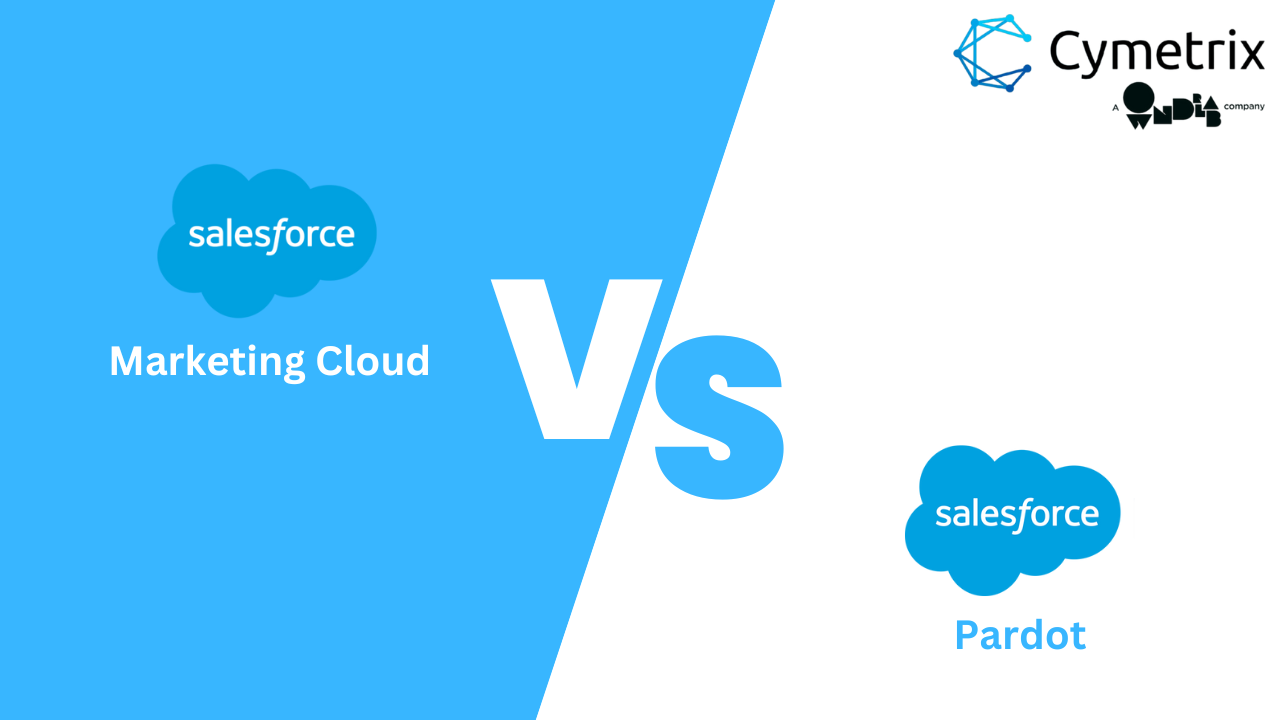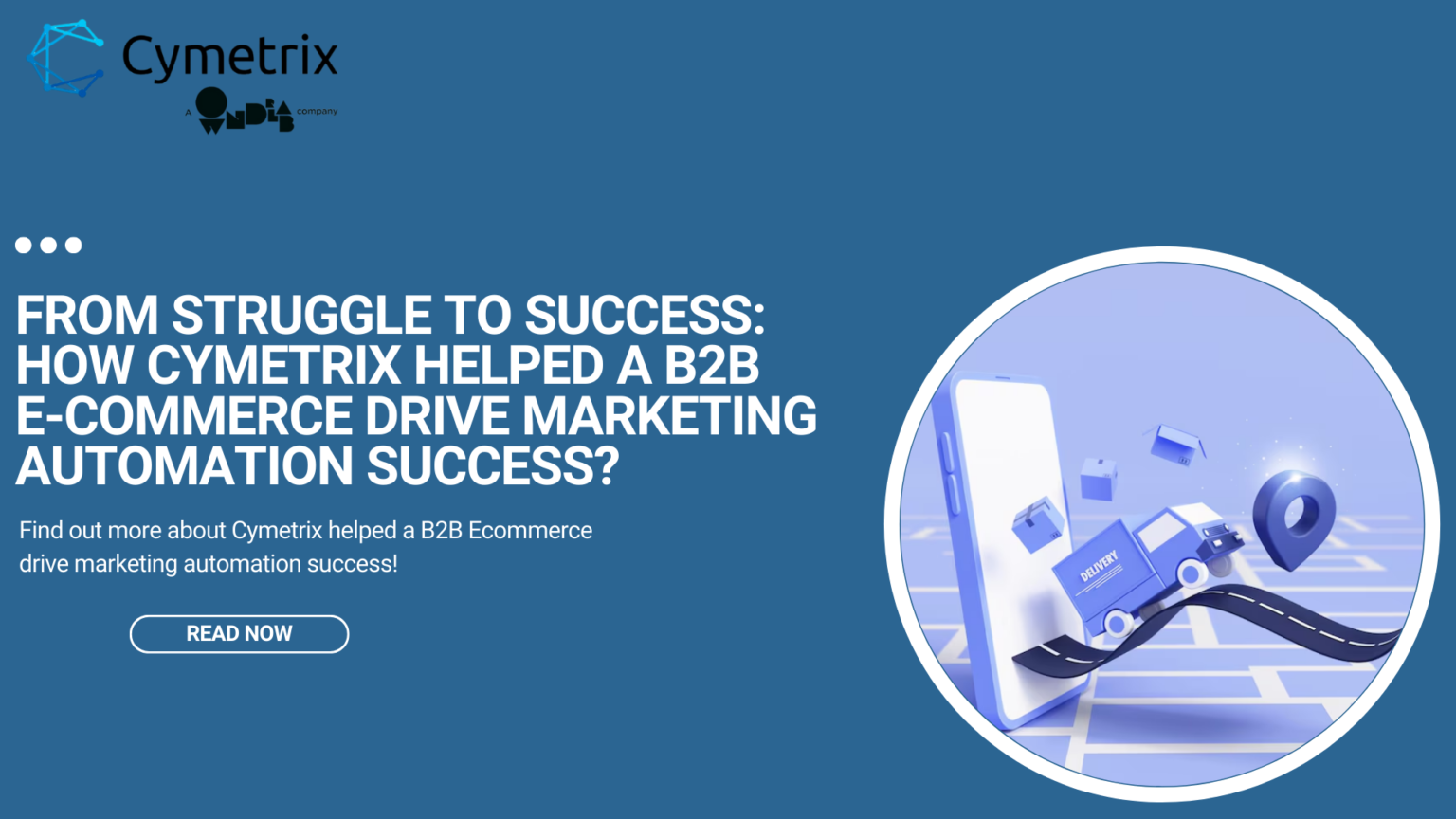
Pardot is for B2B, and Marketing Cloud is for B2C, that is not exactly the right way to interpret and evaluate the best fit of Salesforce Marketing Automation for your organization. Let’s dive deeper into the differences between the two to help you find the right solution.
As technology keeps evolving rapidly, businesses constantly look for ways to optimize their marketing strategies and reach their targeted audience more effectively. That’s where Marketing automation platforms, such as Marketing Cloud and Pardot, have emerged as powerful tools to streamline the marketing process.
With these two prominent options available, choosing one of these platforms can be daunting. So, to make it easier for you to make the best decision, Cymetrix, a leading Salesforce Implementation partner, is here to make a comparative analysis of Salesforce Marketing Cloud and Pardot.
However, before we dive deep and compare the Marketing Cloud and Pardot, let’s take a moment to understand more about both platforms.
What is Salesforce Marketing Cloud?
So, what is the Salesforce marketing cloud? It’s a marketing platform, which businesses can use to gather and harness the power of customer data to craft personalized marketing campaigns that resonate with your targeted audience.
At its core, Salesforce Marketing Cloud is an automation platform that empowers businesses to interact with customers at multiple touchpoints. With Marketing Cloud, you can even automate actions that respond to specific customer behavior.
For instance, you can automate welcome emails to new subscribers, send birthday greetings to loyal customers, or set up abandoned cart reminders for potential buyers.
Now, imagine the prospects you can nurture, the leads with personalized email sequences, cross-sell products based on data from past purchases, or even re-engage customers with targeted campaigns.
Through Marketing Cloud’s automation capabilities, you can say goodbye to mundane tasks, allowing you to focus on strategic initiatives that drive business growth.
What is Pardot?
Pardot is a marketing automation platform designed specifically to address your business needs. It helps you capture leads from various sources, track their engagement with your marketing campaigns, and score them based on their interest level.
This automated process ensures that you focus your sales effort on the most qualified leads, increasing your chance of closing the deals.
What’s more? We believe that Pardot’s automation capabilities lie at the heart of its effectiveness. The way it lets you automate email campaigns, personalize landing pages, and create dynamic content that adapts to each prospect’s needs.
This automation capability can help you save more than time and effort. It can also ensure that your marketing communications are timely and relevant, keeping your prospects engaged throughout their journey.
With Pardot, you can streamline your marketing and sales processes, making it easier to convert leads into customers.
Salesforce Marketing Cloud vs. Pardot
Marketing Cloud and Pardot: Myth Debunked
Is Pardot for B2B and Marketing Cloud for B2C?
Have you heard people saying Pardot is for B2B and Salesforce Marketing Cloud for B2C? Well, to be precise, it’s a bit more complicated than that.
You see, Pardot is a dedicated lead nurturing solution. Its laser-focused approach and user-friendly interface make it ideal for nurturing leads through the long and complex sales funnel. That is generally the case for B2B businesses, however, it’s not limited to that, any business with a complex and long sales cycle can use Pardot.
Anyway, when it comes to Marketing Cloud, it’s an automation platform that specializes in multi-channel automation and advanced analytics. Its extensive feature set and robust automation capabilities cater to the complex needs of large and high-transactional organizations. That again is often referred to be the case for B2C businesses, but it’s never limited to that.
So, as you explore more, you will find examples of companies that deal with customers who are part of the long and complex sales funnel. Whereas, on the other hand, you will see organizations that market to businesses making high transactional purchases, such as SaaS providers.
Is Pardot part of Salesforce Marketing Cloud?
This question is asked way more often than you can think of. Salesforce acquired Pardot, way back in 2013 and to further add to the confusion, it was named Marketing Cloud Engagement in 2022.
Now while Pardot is marketed under the same brand name as Marketing Cloud, its function, architecture, and features all differ from Salesforce Marketing Cloud. These two platforms do not function together, and neither are sold together, they both operate on their own.
However, you may want to know that they are both part of a vast network of the Salesforce ecosystem. But if they are not the same, what’s the difference between them? Let’s have a detailed comparison analysis and find out!
Salesforce Pardot Vs Marketing Cloud: What’s the difference between Marketing Cloud and Pardot?

Now that you understand how both platforms work, we can run a detailed analysis. Let’s dive and have a showdown of Pardot vs Marketing Cloud based on different factors:
![Now that you understand how both platforms work, we can run a detailed analysis. Let’s dive and have a showdown of Pardot vs Marketing Cloud based on different factors: Marketing Cloud and Pardot Functionality Comparison Features While both platforms offer a broad range of features, their emphasis differs. Salesforce Marketing Cloud excels in providing businesses with data-driven marketing automation across multiple touchpoints. Here are a few of its core features that you need to know: Digital Advertising for multi-channel ad campaign management, including ad creation, targeting, optimization, and analytics. Predictive Purchase recommendation to analyze customer data and predict their future purchases, allowing for personalized product recommendations and more effective marketing campaigns. Einstein AI helps predict lead scoring, content personalization, and advanced audience segmentation. Transactional Messaging lets you automate triggered emails, like order confirmations, shipping updates, and account alerts, ensuring timely and relevant communication with your customers. Marketing Cloud for personalization fuels relevant customer experiences in real-time, across emails, websites, and more, using data and AI to craft individual journeys that drive engagement and loyalty. Pardot, on the other hand, offers advanced features like a progressive profiling engine for dynamic form capture and personalization, marketing automation rules with conditional branching, and advanced triggers. Its technical architecture allows businesses to automate complex marketing workflows, personalize outreach at scale, and track campaign performance with actionable insights. Automation Capabilities You must be thinking if both are automation platforms- what’s the difference between them? Well, the approach of both platforms varies. Salesforce Marketing Cloud provides extensive automation options, helping you create intricate, multi-channel campaigns (across multiple touch points, i.e. email, social media, mobile, etc) triggered by customer behaviors. It uses SQL-like query activities to filter and segment data, ensuring your marketing communication reaches the right audience at the right time. Whether it’s an abandoned cart, a click on the link, or even a tweet mentioning your brand – with Marketing Cloud’s automation, you can respond dynamically throughout every touchpoint. Pardot, while seamlessly integrated with Salesforce CRM, focuses on automating the lead nurturing and scoring process. It uses its lead qualification and scoring feature to analyze how a prospect interacts with your content over time. Accordingly, it assigns static scores and gathers customer information, enriching valuable data in Salesforce CRM. As a result, your sales team can easily stay on top of mind over leads over an extended period, especially with high-priority leads. Pricing If you’re wondering about pricing, we can tell you that Marketing Cloud is more expensive than Pardot. That is because it has a wide range of features and is more scalable. It comprises different products/editions, such as Loyalty management, Data Cloud for Marketing, Marketing Cloud intelligence, etc. So, considering various editions and features, you should only invest if you are a large organization with complex marketing requirements. (Note: Marketing Cloud is sold through different products catering to each organization’s individual needs. So, prices may vary based on each organization’s requirements.) Now, pricing of Pardot or Marketing Cloud engagement begins at $1250 for the pro version and $4200 for the corporate edition, with pricing/quotes for the Enterprise version being customizable based on your needs. Integration Capabilities Salesforce Marketing Cloud boasts a robust technical infrastructure that facilitates effortless integration with multiple channels such as email, social media, and other platforms. This unified approach allows businesses or marketers like you to implement marketing campaigns seamlessly across multiple touchpoints. The platform’s API capabilities further enhance its versatility, enabling integration with external systems and custom applications. However, as it’s an independent platform, you would need to use marketing cloud connectors to integrate with the Salesforce platform. As mentioned above, Pardot is built on the Salesforce platform. It seamlessly integrates with Salesforce CRM, and by using a Salesforce-Pardot connector, you can enable bidirectional data sync between both platforms. As a result of this integration, Pardot can automatically segment databases in line with prospect behavior, prospect firmographic data, and what’s happening in CRM. Scalability When we consider scalability, we can assure you from our experience that Marketing Cloud is well-equipped for the task. Its architecture can handle large volumes of customer data, making it an ideal choice for enterprises with large and complex marketing needs. Furthermore, the platform’s support for complex automation workflows contributes to its scalability. You can design and deploy automated marketing campaigns that adapt to the evolving needs of a growing customer base. So, as your audience expands, the platform scales up accordingly, maintaining performance and efficiency. Pardot, on the other hand, excels in efficiently managing mid-sized contact lists and campaign volumes. Its user-friendly interface [often termed as ‘WYSIWYG’ (What you see is what you get)’] and the robust lead-nurturing interface is ideal for businesses with defined buyer journeys and long sales cycles. Pardot’s architecture works well in handling targeted, high-impact campaigns for smaller audiences. However, its limitation arises when dealing with massive data sets or vast array of marketing channels, and that often necessitates migrating to the Marketing Cloud. Thus, if you are a business that anticipates growth but may not require the extensive features (such as catering to massive data sets, marketing channels, or large customer base) offered by Marketing Cloud, Pardot is the platform for you. Case Study To get a better understanding of how both platforms would function in an organization, let’s take a look at a Sample case study for both Salesforce Marketing Cloud and Pardot. Company: Fitzy Apparel Industry: Retail and Fashion Challenges: Fitzy Apparel, a leading fitness apparel brand, while they were pretty successful, needed help to keep up with a broad range of customers across multiple touchpoints. They needed a marketing automation platform, that can help streamline and personalize every interaction with customers and drive more sales. Solution: After careful evaluation, they decided to use the Salesforce Marketing Cloud to fulfill their marketing needs. With this platform, they could automate and personalize customer journeys across multiple touchpoints (email, social, mobile, etc.) The company’s marketing team was even able to track customer behavior and send personalized communications, such as exclusive offers, loyalty discount offers, and birthday greetings. This resulted in a 25% increase in conversion rates, a 30% increase in revenue, and a 20% increase in customer retention Company: Techpro Solutions Industry: Saas Company Challenges: Techpro Solutions, a Saas company was struggling to generate leads and nurture leads effectively through a long and complex sales cycle. So, they were looking for an automation platform to help them navigate the sales cycle and identify/prioritize qualified leads. Solutions: With careful research, Techpro’s team chose Pardot as an appropriate platform for their business. Pardot’s lead scoring and grading feature enabled the company to identify and flag the most qualified leads and forward them to the Sales rep to prioritize those leads. Additionally, they were also able to leverage Pardot’s automation to send timely and relevant content (Case Studies, product demos, webinars, or video resources) to their prospects throughout their journey. As a result, they were able to increase their lead-to-opportunity conversion rate by 35% and overall revenue by 20%. Final Verdict Which Marketing Automation platform is the right choice for your business? As explained, that depends on your specific needs and business goals. If you’re a company with a complex and long sales cycle, Pardot is a great option. However, if you’re a company with a high volume of transactions over multiple channels, Marketing Cloud would be the better choice for your business. Therefore, the best way to decide is by trying both platforms and choosing the one that best suits your business needs. If you’re still unsure, don’t hesitate to contact Cymetrix Software. We can help you assess your business needs and recommend the right platform. So, are you ready to take your marketing to the next level? If so, contact us today to implement Salesforce Marketing Cloud or Pardot for your business.](/sites/default/files/inline-images/Marketing%20Cloud%20and%20Pardot%20Functionality%20Comparison.png)
Features
While both platforms offer a broad range of features, their emphasis differs. Salesforce Marketing Cloud excels in providing businesses with data-driven marketing automation across multiple touchpoints. Here are a few of its core features that you need to know:
- Digital Advertising for multi-channel ad campaign management, including ad creation, targeting, optimization, and analytics.
- Predictive Purchase recommendation to analyze customer data and predict their future purchases, allowing for personalized product recommendations and more effective marketing campaigns.
- Einstein AI helps predict lead scoring, content personalization, and advanced audience segmentation.
- Transactional Messaging lets you automate triggered emails, like order confirmations, shipping updates, and account alerts, ensuring timely and relevant communication with your customers.
- Marketing Cloud for personalization fuels relevant customer experiences in real-time, across emails, websites, and more, using data and AI to craft individual journeys that drive engagement and loyalty.
Pardot, on the other hand, offers advanced features like a progressive profiling engine for dynamic form capture and personalization, marketing automation rules with conditional branching, and advanced triggers.
Its technical architecture allows businesses to automate complex marketing workflows, personalize outreach at scale, and track campaign performance with actionable insights.
Automation Capabilities
You must be thinking if both are automation platforms- what’s the difference between them? Well, the approach of both platforms varies.
Salesforce Marketing Cloud provides extensive automation options, helping you create intricate, multi-channel campaigns (across multiple touch points, i.e. email, social media, mobile, etc) triggered by customer behaviors. It uses SQL-like query activities to filter and segment data, ensuring your marketing communication reaches the right audience at the right time.
Whether it’s an abandoned cart, a click on the link, or even a tweet mentioning your brand – with Marketing Cloud’s automation, you can respond dynamically throughout every touchpoint.
Pardot, while seamlessly integrated with Salesforce CRM, focuses on automating the lead nurturing and scoring process. It uses its lead qualification and scoring feature to analyze how a prospect interacts with your content over time. Accordingly, it assigns static scores and gathers customer information, enriching valuable data in Salesforce CRM.
As a result, your sales team can easily stay on top of mind over leads over an extended period, especially with high-priority leads.
Pricing
If you’re wondering about pricing, we can tell you that Marketing Cloud is more expensive than Pardot. That is because it has a wide range of features and is more scalable. It comprises different products/editions, such as Loyalty management, Data Cloud for Marketing, Marketing Cloud intelligence, etc. So, considering various editions and features, you should only invest if you are a large organization with complex marketing requirements.
(Note: Marketing Cloud is sold through different products catering to each organization’s individual needs. So, prices may vary based on each organization’s requirements.)
Now, pricing of Pardot or Marketing Cloud engagement begins at $1250 for the pro version and $4200 for the corporate edition, with pricing/quotes for the Enterprise version being customizable based on your needs.
Integration Capabilities
Salesforce Marketing Cloud boasts a robust technical infrastructure that facilitates effortless integration with multiple channels such as email, social media, and other platforms. This unified approach allows businesses or marketers like you to implement marketing campaigns seamlessly across multiple touchpoints.
The platform’s API capabilities further enhance its versatility, enabling integration with external systems and custom applications. However, as it’s an independent platform, you would need to use marketing cloud connectors to integrate with the Salesforce platform.
As mentioned above, Pardot is built on the Salesforce platform. It seamlessly integrates with Salesforce CRM, and by using a Salesforce-Pardot connector, you can enable bidirectional data sync between both platforms. As a result of this integration, Pardot can automatically segment databases in line with prospect behavior, prospect firmographic data, and what’s happening in CRM.
Scalability
When we consider scalability, we can assure you from our experience that Marketing Cloud is well-equipped for the task. Its architecture can handle large volumes of customer data, making it an ideal choice for enterprises with large and complex marketing needs.
Furthermore, the platform’s support for complex automation workflows contributes to its scalability. You can design and deploy automated marketing campaigns that adapt to the evolving needs of a growing customer base. So, as your audience expands, the platform scales up accordingly, maintaining performance and efficiency.
Pardot, on the other hand, excels in efficiently managing mid-sized contact lists and campaign volumes. Its user-friendly interface [often termed as ‘WYSIWYG’ (What you see is what you get)’] and the robust lead-nurturing interface is ideal for businesses with defined buyer journeys and long sales cycles.
Pardot’s architecture works well in handling targeted, high-impact campaigns for smaller audiences. However, its limitation arises when dealing with massive data sets or vast array of marketing channels, and that often necessitates migrating to the Marketing Cloud.
Thus, if you are a business that anticipates growth but may not require the extensive features (such as catering to massive data sets, marketing channels, or large customer base) offered by Marketing Cloud, Pardot is the platform for you.
Case Study
To get a better understanding of how both platforms would function in an organization, let’s take a look at a Sample case study for both Salesforce Marketing Cloud and Pardot.
Company: Fitzy Apparel
Industry: Retail and Fashion
Challenges: Fitzy Apparel, a leading fitness apparel brand, while they were pretty successful, needed help to keep up with a broad range of customers across multiple touchpoints. They needed a marketing automation platform, that can help streamline and personalize every interaction with customers and drive more sales.
Solution: After careful evaluation, they decided to use the Salesforce Marketing Cloud to fulfill their marketing needs. With this platform, they could automate and personalize customer journeys across multiple touchpoints (email, social, mobile, etc.)
The company’s marketing team was even able to track customer behavior and send personalized communications, such as exclusive offers, loyalty discount offers, and birthday greetings. This resulted in a 25% increase in conversion rates, a 30% increase in revenue, and a 20% increase in customer retention
Company: Techpro Solutions
Industry: Saas Company
Challenges: Techpro Solutions, a Saas company was struggling to generate leads and nurture leads effectively through a long and complex sales cycle. So, they were looking for an automation platform to help them navigate the sales cycle and identify/prioritize qualified leads.
Solutions: With careful research, Techpro’s team chose Pardot as an appropriate platform for their business. Pardot’s lead scoring and grading feature enabled the company to identify and flag the most qualified leads and forward them to the Sales rep to prioritize those leads.
Additionally, they were also able to leverage Pardot’s automation to send timely and relevant content (Case Studies, product demos, webinars, or video resources) to their prospects throughout their journey. As a result, they were able to increase their lead-to-opportunity conversion rate by 35% and overall revenue by 20%.
Final Verdict
Which Marketing Automation platform is the right choice for your business?
As explained, that depends on your specific needs and business goals. If you’re a company with a complex and long sales cycle, Pardot is a great option.
However, if you’re a company with a high volume of transactions over multiple channels, Marketing Cloud would be the better choice for your business.
Therefore, the best way to decide is by trying both platforms and choosing the one that best suits your business needs. If you’re still unsure, don’t hesitate to contact Cymetrix Software. We can help you assess your business needs and recommend the right platform.
So, are you ready to take your marketing to the next level? If so, contact us today to implement Salesforce Marketing Cloud or Pardot for your business.








